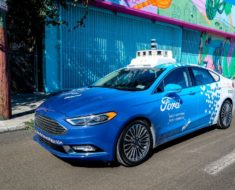The Ford Motor Company was recently approved to receive a patent to start working on the development of a Robocop-like police car that may one day be able to drive itself and issue traffic tickets on its own.
According to a recent news report published by CNET, Ford was granted patent approval for an autonomous law enforcement vehicle that can spot moving violations in real-time as it drives around on patrol. The traffic ticket could be issued by a human police officer or by the artificial intelligence supercomputer that controls the vehicle. Depending on the intent of the law enforcement agency that purchases the autonomous patrol car, various measures could be taken against unlawful drivers, including the option of forcing them to stop.
Details about the patent include the ability to connect to external sensors such as speeding cameras to gather evidence and confirm the issuance of the citation. Other law enforcement actions that this self-driving vehicle may conduct include searching for vehicles or transmitting warnings to speeding drivers so that they are given a chance to slow down in lieu of getting a ticket. In most American jurisdictions, tickets issued by robots could be contested by drivers in court of law.
Drivers should keep in mind that patents tend to be highly speculative, although it is no secret that police departments have been very interested in “Robocop solutions” to augment their law enforcement work. In some states, traffic defense attorneys have been able to fight tickets issued by electronic devices in situations when human police officers have not been present. Lawmakers have also been concerned about manipulation of devices such as red light cameras, which have been tampered by municipalities in an effort to increase revenue.
In 2016, a survey conducted by Wired magazine determined that nearly a dozen police departments around the world had implemented robots to help them carry out their missions. Most robots are assigned to SWAT teams to help officer with tasks such as breaching structures and checking for explosives. In India, drones equipped with non-lethal guns can fire paintballs during riots to either disperse crowds or to help officers identify troublemakers. In Israel, a special police unit that investigates terrorism groups uses a robot equipped with a 9mm pistol to clear rooms and fire upon dangerous suspects. The Los Angeles Police Department operates two remote controlled tanks that can be used to breach fortified structures.
Dil Bole Oberoi





